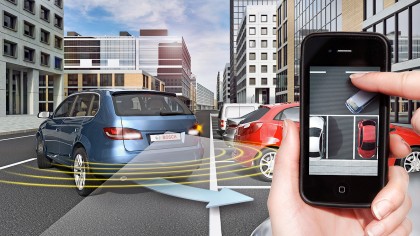We 'drove' a self-driving Bosch car. It was boring as hell, but then that's the point
Bosch's 2020 vision: the car's rollin' but nobody's drivin'…
Sign up for breaking news, reviews, opinion, top tech deals, and more.
You are now subscribed
Your newsletter sign-up was successful

But what of the 'thinking' bit? That's enabled by what Bosch calls its 'connected horizon' technology. The spiel here involves information that goes beyond the car's own sensors. In simple terms, it means an internet connection and access to data like real-time traffic.
Then add in more detailed data like accidents, the location of hazards in the road ahead and even information like changes to road-surface grip due to local weather or fluid spillages. Hoheisel reckons connected horizon, "is what allows automated vehicles to think ahead." They'll know what's coming long before any human driver would and drive accordingly.
In the longer term, it's also what will allow cars to be part of the internet of things. Take this example. Eventually, cars will be automatically aware of available parking spaces in city centres and navigate directly to them instead of the current situation where human drivers waste time searching for spaces.
Big deal? It is, actually. Bosch says automated cars going straight to spaces rather than clogging up roads searching for spaces can reduce traffic by up to 30 per cent in city centres. Now, that's clever.
Sign up for breaking news, reviews, opinion, top tech deals, and more.
Current page: Connected cars that park themselves
Prev Page Driverless cars: first they'll take the motorways Next Page Safety firstTechnology and cars. Increasingly the twain shall meet. Which is handy, because Jeremy (Twitter) is addicted to both. Long-time tech journalist, former editor of iCar magazine and incumbent car guru for T3 magazine, Jeremy reckons in-car technology is about to go thermonuclear. No, not exploding cars. That would be silly. And dangerous. But rather an explosive period of unprecedented innovation. Enjoy the ride.